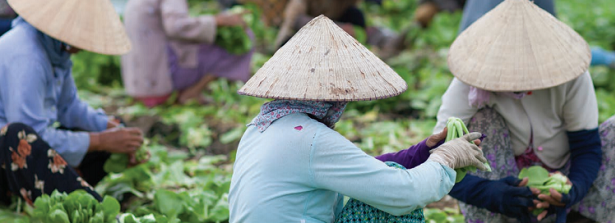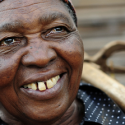Inclusive Agribusiness in Southeast Asia: a peer-to-peer practitioner workshop

At the end of September 2015 some 120 senior practitioners came together for a 2-day workshop: they are all at the forefront of inclusive approaches in SE Asia to engage smallholder farmers in value chains . This Roundtable on Inclusive Agribusiness in Southeast Asia was held in Ho Chi Minh City, Vietnam on September 23 and 24, 2015. Participants included business leaders, key development practitioners, policy makers and research experts, largely from Myanmar, Indonesia, the Philippines and Vietnam.
Three questions shaped the content and form of the workshop:
- Who is active in trying more inclusive approaches in the ASEAN region and how can sharing be strengthened between them?
- What examples are there, and what can we learn from them?
- What policies and other support measures are in place, and where are the gaps?
A dynamic Minister Phat from the Vietnam Ministry of Rural Development and Agriculture (MARD) and the Australian Ambassador Borrowman to Vietnam welcomed this kind of senior practitioner exchange and hoped for more. Participants engaged enthusiastically in a range of workshops, starting with learning from experience. Ten case studies from the region illustrated the potential and issues of more inclusive approaches. The breadth of work heard ranged from coffee to fresh fruit and veg, agricultural inputs to rice, tea, palm oil, pepper, livestock and aquaculture. Clearly the thinking is not restricted to any particular sector.
Background
A wider background scan of cases did point out that businesses may adopt inclusive approaches for quite different a number of reasons, including:
- Incidental inclusiveness – The inclusiveness as an unintended consequence of the company’s business. For example the product the company wishes to buy happens to be mainly produced by small-scale farmers.
- Induced inclusiveness – The company has been persuaded to be inclusive and specifically target the poor in its business strategy.
- Purposeful inclusiveness – The company has made a decision to place equal value on creating social outcomes and revenue in its business strategy
Discussing the various cases led to a range of practical reflections. Globally familiar issues such as the need to involve farmers explicitly in designing the business, ensuring better access to credit and investing in good organisation were equally valid in this region. Interesting other remarks included:
Optimizing profit and sharing value has benefits that can exceed a profit maximization approach at each point along a value chain.
Prohibitive trade barriers within the region inadvertently limit the growth of inclusive businesses.
There is a strong need to define what constitutes ‘inclusive’ in terms of economic benefits for farmers as well as ownership, decision making power, risk management and monopoly issues around both input and output markets. The term is used too lightly.
Background research by one of the partners, the Food Systems Innovation Initiative (FSI) noted that many global agri-businesses have made a corporate commitment to inclusive business and are successfully piloting a number of schemes. However, interestingly they saw that small and medium scale enterprises (SMEs) are a critical source of inclusive business innovation because of their role in making new products and services available to smallholder farmers that aid their entry into value chains. It is in the SME sector that public investments could have catalytic effects in disrupting business practice, spreading inclusive business models in the wider agribusiness sector. By the end of the workshop this was clearly reflected in a message for the future: draw in national SMEs more effectively into this space.
Another background study shared with participants the current status of impact investing in inclusive agribusiness in Southeast Asia. From this it was clear that there is plenty of investment money interested – in theory – in investing in inclusive initiatives. However, this is not ‘patient capital’: all investors are looking for businesses that have at least two to three years trading history, a healthy balance sheet, professional management, commercial or near-commercial returns and potential for existing social impact to scale. From the investors’ perspective the key problem is a limited pool of ‘investable’ agri-businesses. Not surprisingly, many of the initiatives at the workshop felt they are ready for investments, but investors do not take the ‘inclusive’ dimension seriously.
Key issues
Five cross-cutting themes were identified through interviews prior to the workshop as key issues in the region. Each was explored, also drawing on case study discussions, and gave ideas on how to work on some of the issues. The topics were:
Delivering impact at scale – One striking point was that simply extrapolating from successful pilots is not sufficient: replication across crops and geographies may work better;
Integrating women in inclusive agribusiness – Despite the growing role of women in agribusiness, they are not structurally addressed by inclusive initiatives. Some participants felt this would only improve if a more persuasive and specific narrative is developed for businesses about the need to integrate women as key stakeholders in agriculture.
Enabling policies for inclusive agribusiness – Participants felt better policies are needed to improve innovation, infrastructure and provide a better business enabling environment, greater access to credit and effective land tenure arrangements. Interestingly it was noted that in many regulatory areas the region underperforms in comparison to countries in South America and Africa.
Securing finance for smallholders – One pointer: draw financial institutions in as direct stakeholders in agriculture value chain discussions, rather than as ancillary stakeholders
Inclusive business models – There was a strong need to be much more sophisticated about defining and targeting inclusiveness.
Knowledge and action agenda
The workshop took all these findings into four country sessions, to identify priorities and champions at that level to make inclusiveness a more compelling choice. These fed back into a dozen key knowledge issues that were unpacked in several world café’s. Together they form an appealing knowledge and action agenda for the region. Topics were:
Genuine farmer voice; Effective public-private partnerships (PPP); Define and prioritize inclusiveness; Performance measurement; SME engagement; Donor linkages; Value chain finance; Policy research; Community of Practice; Regional commodity trade; Case Study and Best Practice Research.
Overall priorities from the workshop honed in on six areas that this community of practice feels need most urgent attention:
- Seat at the table – It is important to ensure that all stakeholders have a seat at the table, especially farmers, local companies, and SMEs.
- Make the business case – Performance measurement is essential for making the business case to companies and farmers to engage in inclusive value chain approaches. There is need to build capacity to understand, collect and analyze performance data.
- Secure financing – The need for financing to smallholder farmers and throughout the value chain is essential to improve agriculture development. This requires collaboration with a variety of financial institutions.
- Supportive policies – Identifying policy needs and supporting dialogue remains central to the discussion about how to support smallholder farmers and sustainable agriculture.
- Community of practice – Communities of practice help to deepen the partnership network and draw on other’s knowledge and strengths. In particular, there was interest in bringing donors as active participants into the discussions.
- Knowledge exchange – A knowledge exchange to facilitate cross-country and cross-crop learning will enable better exchange of best practices, tools and solutions.
More information
The Roundtable itself was an example of the value of multi-stakeholder collaboration being a joint initiative of Grow Asia, Seas of Change (Wageningen UR), the Food Systems Innovation Initiative, the Australian Department of Foreign Affairs and Trade and the Global Donor Platform for Rural Development. Further generous funding was provided by the Food & Business Knowledge Platform.
A full report, including participant list, is available at the website www.inclusiveasia.org. Background reports and case studies are made available as they are finalized.
Interested to hear more? Contact Joost Guijt, Seas of Change and Centre for Development Innovation, Wageningen UR at .






